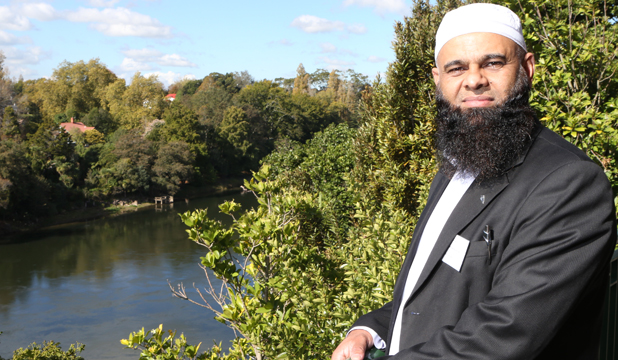
DON’T FEAR ISLAM: Halal Tourism and Hospitality keynote speaker Mohammad Alam.
New Zealand has been urged to move beyond fearing Islam and make the most of a rapidly growing Muslim tourist market.
That was the message at New Zealand’s first Halal Tourism and Hospitality Symposium in Hamilton.
Halal, an important part of the Islamic faith, denotes an action or object that is permissible by Islamic laws.
A recent Dinar Standard report called The State of the Global Islamic Economy estimated Muslims spent $137 billion a year tourism. That figure is expected to reach $181b by 2018.
Waikato University’s Dr Chris Ryan said that outbound tourists from New Zealand’s nearest Muslim neighbour, Indonesia, were at 7.5 million in 2012. New Zealand scooped up 13,600 of those.
In total, Indonesian visitors spend just over 84,800 days in the country per year.
Malaysia, another Muslim country, adds a total of 321,700 visitor days per year to New Zealand’s tourism industry.
By comparison, Australian visitor days totalled 5.4 million, with Chinese racking up 1.2 million days.
“The figures are, in real terms, still quite low,” Ryan said.
“We are currently but scratching the surface.”
Part of the solution was to offer more “reassurance factors” to Muslim tourists, like halal food, placing markers in hotel rooms pointing to Mecca (the direction in which Muslims must pray) and advertising nearby mosques where they could worship or connect with other Muslims.
Advertising also needed to centre on Muslim-friendly activities. Muslim tourists tended to avoid beach holidays, and looked for family-oriented holidays.
Walking, visiting heritage sites, lookouts and geothermal or volcanic attractions rated highly on the list of popular activities for Muslims.
Islam encouraged travel “to visit friends and family” and that Muslims were instructed by the Koran to see the beauty of God’s world, which New Zealand had plenty of, Ryan said.
Halal tourism operator Mohammad Alam, owner of MK Tours, said New Zealand’s current halal offering surprised many visitors, but it was not well marketed.
“We are fully prepared to receive and entertain Muslim travellers,” Alam said.
“We have enough halal available and enough prayer places … for anyone who is Muslim to feel comfortable.”
South Korea and Japan were marketing their tourist offering aggressively in Muslim countries, and were better known because of it, he said.
Tourist operators interested in learning more about halal should contact the Federation of Islamic Associations of New Zealand, and take steps like employing a Muslim staff member who would be halal-conscious, or offering a prayer room.
“The presence of these things do make a difference.”
The symposium was organised by New Zealand universities, government departments, tourism organisations and Fianz.
